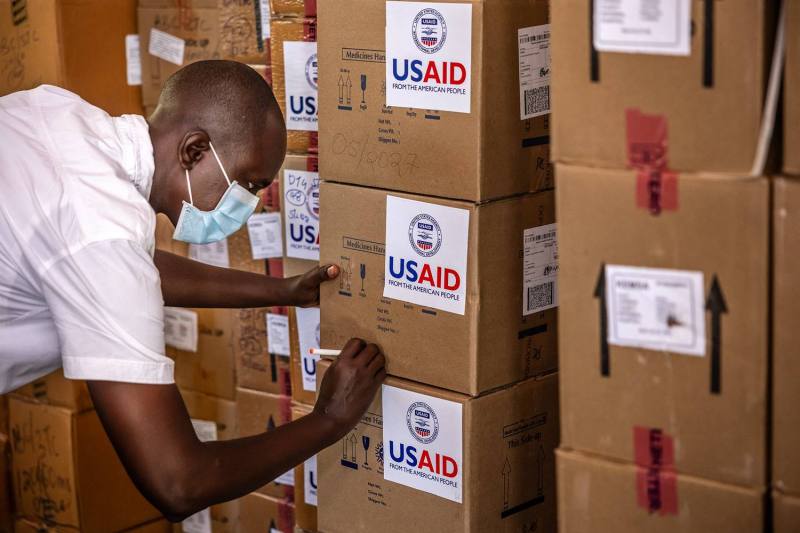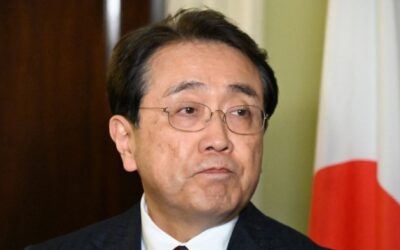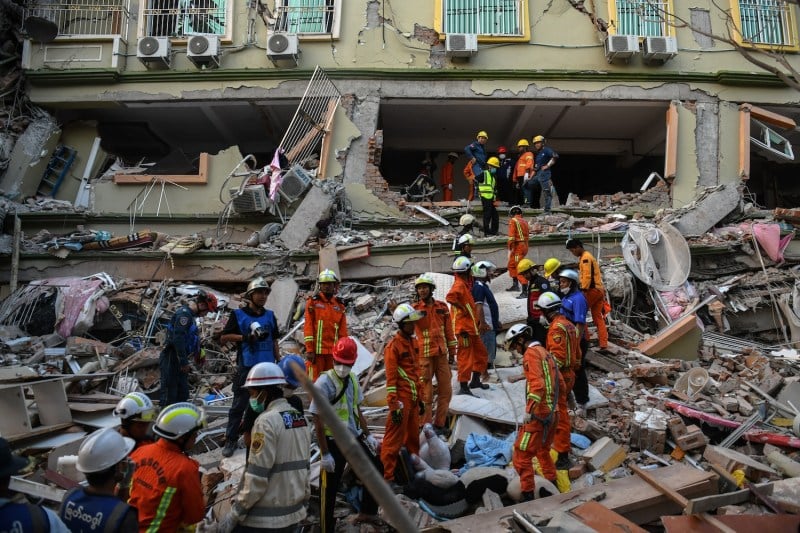The Fatal Impact of Trump’s Foreign Aid Cuts

The Fatal Impact of Trump’s Foreign Aid Cuts
The head of the Danish Refugee Council speaks on the far-reaching consequences of Trump slashing U.S. foreign aid.
A member of the pharmacology department at Lodwar County Referral Hospital takes inventory of the last boxes of drugs delivered by the now-dismantled USAID amid medical supply shortages in Lodwar, Kenya, on April 1. Luis Tato/AFP via Getty Images
The Trump administration’s drastic foreign aid cuts and effort to dismantle the U.S. Agency for International Development (USAID) have had rapid, rippling consequences across the world.
Foreign Policy recently sat down with Charlotte Slente, secretary-general of the Danish Refugee Council, to discuss the far-reaching effects of Trump dramatically slashing foreign assistance.
The Trump administration’s drastic foreign aid cuts and effort to dismantle the U.S. Agency for International Development (USAID) have had rapid, rippling consequences across the world.
Foreign Policy recently sat down with Charlotte Slente, secretary-general of the Danish Refugee Council, to discuss the far-reaching effects of Trump dramatically slashing foreign assistance.
As the new administration in Washington axes more and more lifesaving programs, Slente warned that “people will be dying.” In a world where the U.S. is no longer seen as a reliable partner, Slente also discussed where aid groups go from here.
Foreign Policy: Where has your work been hit hardest by [U.S. President Donald] Trump’s aid cuts?
Charlotte Slente: The Danish Refugee Council is active in around 40 countries around the world—primarily countries where we see large humanitarian crises and displacement crises, because we are a displacement-mandated organization, which means that we work on these great, big contracts. And among the 40 countries that we are present in, we’ve been hit in 22. It’s across the globe in different environments and a little bit random, depending on where the U.S. funding falls.
The U.S. was our second-biggest donor—20 percent of our income was from the U.S. We’ve been hit in many countries in Africa, we’ve been hit in Latin America, we’ve also been hit in Asia, and in Ukraine. It’s been quite a bumpy road.
FP: What has the immediate impact of these aid cuts been on the ground? What kind of damage has already been done?
CS: In Afghanistan, for instance, we were supporting drinking water for thousands and thousands of people in a number of provinces. That was cut down immediately. So the effect is that these people will not get access to safe drinking water in these provinces.
That can have fatal consequences.
In Congo and Sudan, both countries where there are very severe humanitarian disaster situations ongoing, there were cuts to our ability to help people with support for livelihoods.
Humanitarian assistance saves lives, but we need people to be able to gain an income and be self-sustaining. That kind of support for people being able to grow food or work in agriculture, maybe work in other areas, that growth has all been cut off.
In Cameroon, we were delivering food assistance to pregnant mothers and their undernourished young children, and that has been cut off from one day to the next. In Colombia, a lot of our work on providing shelter, livelihood support, and activities related to mine clearance, which is one of the sectors we work with a lot in, has been stopped.
FP: So, all of this has really had rippling consequences across the world?
CS: In many different countries, it has had quite dramatic consequences.
FP: Is it fair to say that people are dying because of the Trump administration’s choices?
CS: People will be dying, and people will be losing possibilities to sustain their lives in the long term.
It is a very, very difficult moment because the number of displaced people around the world is over 120 million. The number of people requiring humanitarian assistance around the world is over 300 million people.
Humanitarian response plans, which are U.N. plans where basically you stipulate what is the bare minimum of necessity among the people who need humanitarian assistance in the country, were only partially being performed and funded to the degree necessary. The direct consequence of U.S. cuts could be that those response plans in general will only be funded to a degree of 25 percent, which means many people will potentially lose their lives because they depend on that humanitarian response.
The vast majority of this world’s refugees are actually hosted by neighboring countries who are themselves low-income or low-medium-income countries who need support from the international community to actually accept being hosts to refugees and displaced peoples.
FP: With U.S. funding drying up, where are you looking to fill the gaps?
CS: We’re basically looking everywhere, but these gaps are very difficult to fill.
U.S. development ODA [official development assistance] funding is less than 0.3 percent of U.S. GDP. But nominally, it is 40 percent of all humanitarian assistance provided throughout the globe.
It’s fair to say that it will be very difficult for any of the traditional donors that fund humanitarian assistance to replace that level of funding. But obviously, we are trying our best with a number of donors.
But we also need to look elsewhere—such as non-traditional government donors like the Gulf states. We’re looking toward Asia as well to seek more funding.
We also need to look toward the private sector—there’s no way of escaping that. We’ve been working for a number of years to attract private-sector and foundation funding packages, and creating products that could be interesting for the private sector.
If you look around the U.S., there are a number of very rich people who could potentially replace that funding if there is a willingness, vision, and ambition to actually support what you could call global public goods. I think it is a global public good to support the humanitarian needs of this world’s displaced and needy people, because it is a global challenge that we need to find global solutions for.
FP: What is the best case for why a country like the United States should be heavily involved in providing humanitarian aid?
CS: First and foremost is the altruistic part of it—saving lives around the globe. And supporting the countries that have been asked to host people who basically would not survive if they didn’t host them. These are people who, if they are not hosted by neighboring countries, would be coming to the U.S. and Europe for support. People want to stay close to their homes in order to see when it’s feasible for them to return.
Secondly, there is a security element, there’s a self-interest, which may not be directly transactional. It’s a broader self-interest in international security. There’s these very conflict-prone, fragile settings—where people live in very complicated situations in conflict—that are prone to becoming a problem for the international community. It’s especially in these fragile countries where armed groups enter and terrorism can thrive. A lot of violence will happen because people have a lack of access to resources. And that tends to not stay in these countries. It tends to not even stay in the regions, but actually spreads around the world. That is another very good reason for continuing to support.
The world doesn’t thrive if it’s too unprofitable. We need to eliminate inequality levels to the greatest extent possible. And we need to create the framework conditions for these countries to be able to build their businesses, grow their economies, have transparency in their trade systems, and be able to attract international financing. And that is also in our self-interest. The more open and transparent and trading the world is, the better everyone could be.
It’s counterintuitive to not support the world’s Colombias, Lebanons, Jordans, Ugandas—who really have been extremely generous in hosting many refugees. Colombia hosts millions of Venezuelan refugees and migrants. And many of those that are hosted in Colombia and supported there don’t continue the journey up north through the Darién Gap.
At this moment in time we have a number of crises where people are extremely desperate. I just spoke to the [United Nations] Security Council about the situation in the Democratic Republic of [the] Congo. That is one of the areas where we see a big crisis. We see a country like Sudan being caught up in a crisis, and we see so many cases around the world where conflicts are actually tearing the world down for the civilian populations. We all know that there should be respect for international humanitarian law, which means that the negative impact for civilians should be avoided in any kind of warfare, in any kind of conflict.
We really need the world to step up to solve these crises, build peace, and do the utmost to stop the violence, stop the conflicts—from the Middle East and Africa to Asia and South America. We cannot, as an international community, avoid responsibility. That’s one of my very firm messages at this time.
This post is part of FP’s ongoing coverage of the Trump administration. Follow along here.
John Haltiwanger is a reporter at Foreign Policy. X: @jchaltiwanger
More from Foreign Policy
-

American flags are draped around tables and pipes in a small factory room as women work at sewing machines to produce them. Tariffs Can Actually Work—if Only Trump Understood How
Smart trade policy could help restore jobs, but the president’s carpet-bomb approach portends disaster.
-

Donald Trump looks up as he sits beside China’s President Xi Jinping during a tour of the Forbidden City in Beijing on Nov. 8, 2017. Asia Is Getting Dangerously Unbalanced
The Trump administration continues to create headlines, but the real story may be elsewhere.
-

Trump announces tariffs Trump’s Wanton Tariffs Will Shatter the World Economy
Economic warfare is also a test for U.S. democracy.
-

The Department of Education building in Washington, DC on March 24. Why Republicans Hate the Education Department
Broad popular support means that even Ronald Reagan failed at dismantling the agency.











Join the Conversation
Commenting on this and other recent articles is just one benefit of a Foreign Policy subscription.
Already a subscriber?
.
Subscribe
Subscribe
View Comments
Join the Conversation
Join the conversation on this and other recent Foreign Policy articles when you subscribe now.
Subscribe
Subscribe
Not your account?
View Comments
Join the Conversation
Please follow our comment guidelines, stay on topic, and be civil, courteous, and respectful of others’ beliefs.
Change your username |
Log out
Change your username:
CANCEL
Confirm your username to get started.
The default username below has been generated using the first name and last initial on your FP subscriber account. Usernames may be updated at any time and must not contain inappropriate or offensive language.